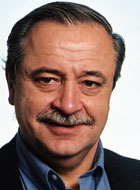Overweight people who lose a moderate amount of weight get an immediate benefit in the form of better heart health, according to a School of Medicine study. And the heart improvements happen whether that weight is shed by eating less or exercising more.
“If individuals want to do something that’s good for their heart, then my message to them is lose weight by the method they find most tolerable,” said the study’s senior author Sándor J. Kovács, M.D., Ph.D., director of the Cardiovascular Biophysics Laboratory and associate professor of medicine. “They’re virtually guaranteed that it will have a salutary effect on their cardiovascular system.”

Studying a group of healthy, overweight but not obese, middle-aged men and women, the researchers found that a yearlong regimen of either calorie restriction or increased exercise had positive effects on heart function. Their analysis revealed that heart function was restored to a more youthful state so that during the heart’s filling phase (called diastole) it took less time for participants’ hearts to relax and fill with blood. The findings will appear in an upcoming issue of the American Journal of Physiology and are available online.
“As we get older, our tissues become more fibrotic as collagen fibers accumulate,” said study co-author John O. Holloszy, M.D., professor of medicine in the Division of Geriatrics and Nutritional Science. “So the arteries and heart muscle stiffen, and the heart doesn’t relax as well after contracting. Similar studies that we’ve conducted with members of the Caloric Restriction with Optimal Nutrition Society (CRONies) show they have heart function resembling much younger people.” CRONies voluntarily consume about 25 percent fewer calories than the average American while still maintaining good nutrition.
The scientists used ultrasound imaging (echocardiography) to measure the diastolic or filling phase of the cardiac cycle because it is a crucial indicator of heart health.
“During filling, the left ventricle is a suction pump,” Kovács said. “Think of the rubber bulb of an old-fashioned bicycle horn — you squeeze it (the analog of the ejection phase of the cardiac cycle), then let go (the analog of the filling or diastolic phase) and the rubber bulb springs back to its original shape, sucking air back in. Similarly, the heart’s muscle and connective tissue are elastic, and after ejecting blood to the body during contraction (systole), the left ventricle springs back to draw in new blood (diastole). It’s during this filling phase of the cardiac cycle that subtle changes in heart health can be most readily detected.”
By the end of the yearlong study, both the calorie restriction and exercise groups of volunteers lost 12 percent of their weight and 12 percent of their body mass index (BMI), a measurement considered to be a reliable indicator of the amount of body fat. In both groups, participants’ hearts responded to this weight loss by gaining the ability to relax more quickly, recovering some of the elasticity characteristic of younger heart tissue. Those in the calorie restriction group achieved slightly more reduction of heart stiffness.
Although previous studies also have indicated that the heart benefits from weight loss, those studies were performed on morbidly obese people, few focused on diastolic function and none used a sophisticated method developed by Kovács called parameterized diastolic filling (PDF) formalism. By looking at filling function in healthy, non-obese people using PDF formalism, the researchers in the current study were able to understand in more detail how normal hearts react to moderate weight loss.
Kovács said he feels the study offers encouragement for those who are overweight.
“One reason that it’s hard to get people to change their behavior and lose weight is that we warn them about consequences of being overweight that might occur sometime in the future — we say if your BMI is too high, eventually you’ll develop heart disease, diabetes or hypertension,” Kovács said. “But now we can tell them, lose weight and right away you can have better cardiovascular health.”